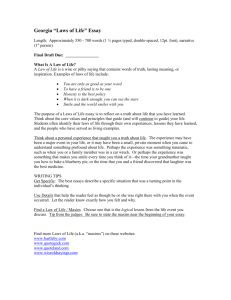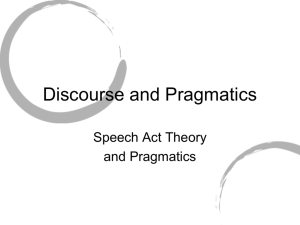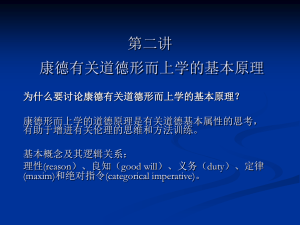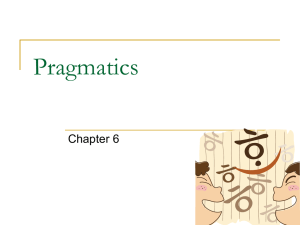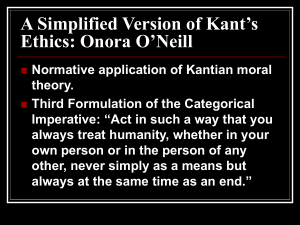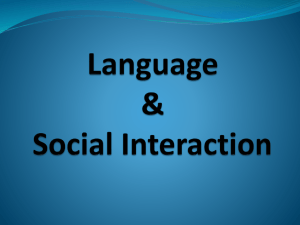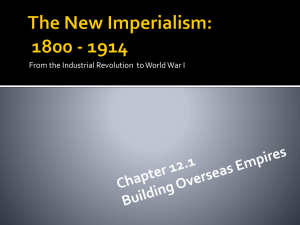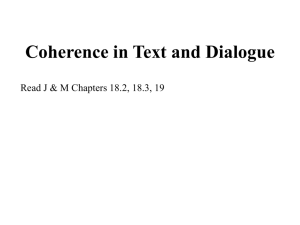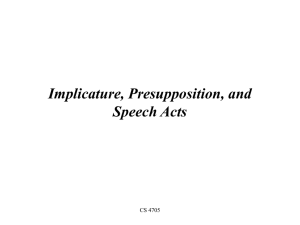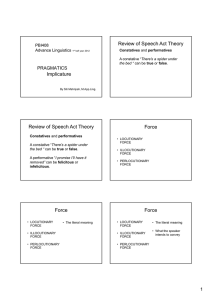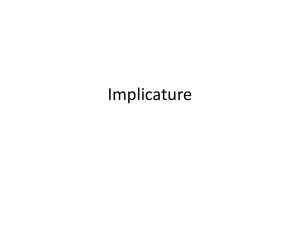08Chapter 8_pragmatics
advertisement
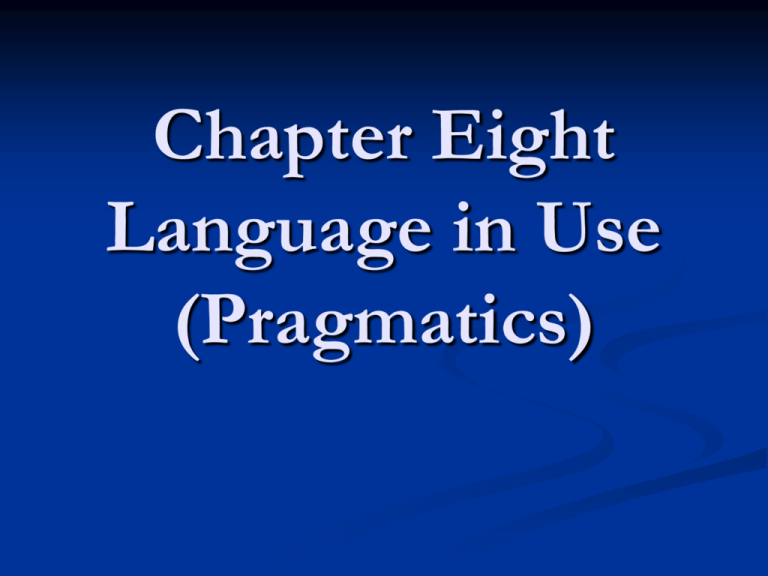
Chapter Eight Language in Use (Pragmatics) 1. Introduction: Definition of Pragmatics The study of language in use. The study of meaning in context. The study of speakers’ meaning, utterance meaning, & contextual meaning. Speaker’s meaning (A father is trying to get his 3-year-old daughter to stop lifting up her dress to display her new underwear to the assemble.) Father: We don’t DO that. Daughter: I KNOW, Daddy. You don’t WEAR dresses. Utterance Meaning vs. Sentence Meaning Utterance vs. Sentence Sentence: abstract units of the language system. Utterance: units of language in use. Sentence meaning: What does X mean? Utterance meaning: What do you mean by X? Ex. 1. Dog! 3. My bag is heavy. 4. “Janet! Donkeys!” (David Copperfield) It’s cold here. Contextual Meaning: meaning in context The meaning of the sentence depends on who the speaker is , who the hearer is, when and where it is used. It was a hot Christmas day so we went down to the beach in the afternoon and had a good time swimming and surfing. Semantic meaning: the more constant, inherent side of meaning Pragmatic meaning: the more indeterminate, the more closely related to context 1.A: Are you going to the seminar? B: It’s on linguistics. 2.A: Would you like some coffee? B: Coffee would keep me awake. 3.A: 我带的钱不够,今天买不了。 B: 那就下次再买吧。 T1 A: 这件衣服很漂亮,可我今天带的钱不够。 T2 B: 那就下次再买吧。 Y1 我带的钱不够,今天买不了。 Y2 我带的钱不够,你借钱给我买 Y3 你带的钱不够,就下次再买。 Y4 我不想借钱给你。 A意欲传递的意义 B所获得的意义 B通过T2意欲传递的意义 交际结果 1 Y1 Y1 Y3 —M(无误解) 2 Y1 Y1 Y4 DMI 3 Y1 Y2 Y3 M 4 Y1 Y2 Y4 M 5 Y2 Y2 Y3 DMI 6 Y2 Y2 Y4 —M 7 Y2 Y1 Y3 M 8 Y2 Y1 Y4 M 2. Speech Act Theory John Austin How to Do Things with Words (1962) speech acts: actions performed via utterances Constatives vs. performatives Constatives: utterances which roughly serves to state a fact, report that something is the case, or describe what something is, eg: I go to the park every Sunday. I teach English. Performatives: utterances which are used to perform acts, do not describe or report anything at all; the uttering of the sentence is the doing of an action; they cannot be said to be true or false. Performative verbs: name, bet, etc. I do. I name this ship Queen Elizabeth. I bet you sixpence it will rain tomorrow. I give and bequeath my watch to my brother. I promise to finish it in time. I apologize. I decare the meeting open. I warn you that the bull will charge. Felicity conditions: A. (i) There must be a relevant conventional procedure. (ii) the relevant participants and circumstances must be appropriate. B. The procedure must be executed correctly and completely. C. Very often, the relevant people must have the requisite thoughts, feelings and intentions, and must follow it up with actions as specified. Problems with felicity conditions No strict procedure for promising. I promise. I give my word for it. I bequeath my watch to my brother. (T or F?) Minister: addressing the groom) (Groom’s Name), do you take (Bride’s Name) for your lawful wedded wife, to live together after God’s ordinance, in the holy estate of matrimony? Will you love, honor, comfort, and cherish her from this day forward, forsaking all others, keeping only unto her for as long as you both shall live? XXX,你是否愿意娶xxx为妻,按照圣经的教训与他 同住,在神面前和她结为一体,爱她、安慰她、尊重 她、保护他,像你爱自己一样。不论她生病或是健康、 富有或贫穷,始终忠於她,直到离开世界? Groom: I do. Features of performatives The first person singular Speech act verbs / performative verbs: The present tense Indicative mood Active voice I promise to be there. / I’ll be there. I admit I was wrong. / I was foolish. I warn you, this gun is loaded. / This gun is loaded. I thank you. / I’m very grateful. I apologize. / I’m sorry. I order you to sit down. / You must sit down. Conclusion: The distinction between constatives & performatives cannot be maintained. All sentences can be used to do things. Illocutionary Act Theory Speech acts can be analyzed on 3 levels: A locutionary act: the act of saying something in the full sense of “say”. An illocutionary act: an act performed in saying something. To say sth is to do sth. In saying X, I was doing Y. In saying “I will come tomorrow”, I was making a promise. Illocutionary force A perlocutionary act: the act preformed by or as a result of saying, the effects on the hearer. By saying X and doing Y, I did Z. By saying “I will come tomorrow” and making a promise, I reassure my friends. Shoot her! 3. Conversational Implicature People do not usually say things directly but tend to imply them. H. P. Grice William James lectures at Harvard in 1967 Logic and Conversation in 1975 Grice’s theory Logic and Conversation is an attempt at explaining how a hearer gets from what is said to what is meant, from the level of expressed meaning to the level of implied meaning. Implicature Make your contribution such as required at the stage at which it occurs by the accepted purpose or direction of the talk exchange in which you are engaged. Maxim of Quality: Don not say what you believe to be false. Do not say something if you lack adequate evidence; Maxim of Quantity: Make your contribution as informative as required (for the current purposes of the exchange) . Do not make your contribution more informative than required. Maxim of Relation: Be relative. Maxim of Manner: Be perspicuous. Avoid obscurity of expression. Avoid ambiguity. Be brief. Be orderly. CP is meant to describe what actually happens in conversation. People tend to be cooperative and obey CP in communication. However, CP is often violated. Since CP is regulative, CP can be violated. Violation of CP and its maxims leads to conversational implicature. Violation of the maxims (Quantity) 1. Make your contribution as informative as is required. A: 昨天上街买了些什么? B: 就买了些东西。 > I don’t want to tell you what I bought. Dear Sir, Mr. X’s command of English is excellent, and his attendance at tutorials has been regular. Yours > Mr. X is not suitable for the job. 2. Do not make your contribution more informative than is required. Aunt: How did Jimmy do his history exam? Mother: Oh, not at all well. Teachers asked him things that happened before the poor boy was born. > Her son should not be blamed. A: Your kid broke the window. B: Boys are boys. > War is war. > Violation of the maxims (Quality) 1. Do not say what you believe to be false. You are the cream in my coffee. X runs as fast as a deer. He is made of iron. 2. Do not say that for which you lack adequate evidence. A: Beirut is in Peru, isn’t it? B: And Rome is in Romania, I suppose. > It’s ridiculous. Violation of the maxims (Relation) Be relevant. A: Prof. Wang is an old bag. B: Nice weather for the time of year. > I don’t want to talk about Prof. Wang. 萍:爸爸,不过四凤同鲁贵在家里都很好,很 忠 诚的。 朴:恩,我很累了。 我预备到书房歇一下。 你 叫他们送一碗浓一点的普洱茶来。 > Violation of the maxims (Manner) 1. Avoid obscurity of expression A: Let’s get the kids something. B: Ok, but I veto C-H-O-C-O-L-A-TE. > Don’t give them chocolate. 2. Avoid ambiguity A: Name and title, please? B: John Smith, Associate Editor and professor. CI: 买一赠一。 3. Be brief A: Did you get my assignment? B: I received two pages clipped together and covered with rows of black squiggles. > not satisfied. Characteristics of implicature Calculability: hearers work out implicature based on literal meaning, CP and its maxims, context, etc. Cancellability / defeasibility: If the linguistic or situational contexts changes, the implicature will also change. A: Do you want some coffee? B: Coffee would keep me awake. I do not like coffee. B: Coffee would keep me awake. I want to stay up. Non-detachability: implicature is attached to the semantic content of what is said, not to the linguistic form; implicatures do not vanish if the words of an utterance are changed for synonyms. A: Shall we go the cinema tonight? B: There’ll be an exam tomorrow. I’ll take an exam tomorrow. Isn’t there an exam tomorrow? Characteristics of implicature Non-conventionality: implicature is different from its conventional meaning of words. It is contextdependent. It varies with context. A1:下午踢球去吧! A2:老王住院了? A3: 足球场安装了一个新门柱。 B:上午还在换草皮。 4. Politeness Principle Grice’s CP does not explain why speakers often violate CP . Leech (1983) puts forward PP to save CP. A: We’ll miss Bill and Mary, won’t we? B: Well, we’ll all miss Bill. (violation of quantity maxim) Self(自身)----refers to the speaker. Other (他人)----refers to the addressee or a third person, present or not. Benefit (惠) & Cost (损) Generally speaking, if there is benefit, there must be cost. For some acts such as giving an invitation, a piece of advice and an offer are considered polite-natured, for other is always on the beneficial side. For other acts like a request, an order and a demand are considered impolite-natured, for other is always on the cost side. Tact Maxim Generosity Maxim Approbation Maxim Modesty Maxim Agreement Maxim Sympathy Maxim Tact Maxim a) Minimize cost to other b) Maximize benefit to other ] Generosity Maxim a) Minimize benefit to self b) Maximize cost to self ] 把车借给我用两天。 洗一洗这些衣服。 把铅笔递一下。 再来一杯啤酒。 周末好好休息。 把房间打扫一下。 我想知道你是否有时间打扫一下房间。 Approbation Maxim a) Minimize dispraise of other b) Maximize praise of other Modesty Maxim a) Minimize praise of self b) Maximize dispraise of self A:我的西装怎么样? B:难看死拉。 怎么说呢,不过我觉得颜色深了点。 A:今天真倒霉! B:我说的吧,自找的。 过去就算了,别再想拉。 Agreement Maxim a) Minimize disagreement between self and other b) Maximize agreement between self and other Sympathy Maxim a) Minimize antipathy between self and other b) Maximize sympathy between self and other A:我提议大家明天到南塬上烧烤。 B:我没意见。 可以,但风太大啊。 我不去,没意思。 A:我的腿不方便。 B:我知道,上次摔断了。 那小心点,我来吧。
